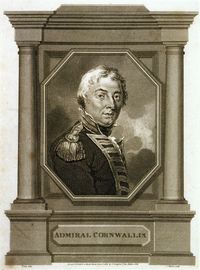The directory «Plots of stamps in the catalogue»
Cornwallis William
(1744—1819)

William was a British admiral, the brother of the 1st Marquess Cornwallis, governor-general of India. He was born on the loath of February 1744, and entered the navy in 1755. His promotion was naturally rapid, and in 1766 he had reached post-rank. Until 1779 he held various commands doing the regular work of the navy in convoy. In that year he commanded the " Lion " (64) in the fleet of Admiral Byron. The "Lion" was very roughly handled in the battle off Grenada on the 6th of July 1779, and had to make her way alone to Jamaica. In March 1780 he fought an action in company with two other vessels against a much superior French force off Monti Cristi, and had another encounter with them near Bermuda in June. The force he engaged was the fleet carrying the troops of Rochambeau to North America, and was too strong for his squadron of two small liners, two fifty-gun ships and a frigate. After taking part in the second relief of Gibraltar, he returned to North America, and served with Hood in the actions at the Basse Terre of St Kitts, and with Rodney in the battle of Dominica on the 12th of April 1782. Some very rough verses which he wrote on the action have been printed in Leyland's " Brest-Papers," published for the Navy Record Society, which show that he thought very ill of Rodney's conduct of the battle. In 1788 he went to the East Indies as commodore, where he remained till 1794. He had some share in the war with Tippoo Sahib, and helped to reduce Pondicherry. His promotion to rear-admiral dates from the 1st of February 1793, and on the 4th of July 1794 he became vice-admiral. In the Revolutionary War his services were in the Channel. The most signal of them was performed on the 16th of June 1795, when he carried out what was always spoken of with respect as "the retreat of Cornwallis". He was cruising near Brest with four sail of the line and two frigates, when he was sighted by a French fleet of twelve sail of the line, and many large frigates commanded by Villaret Joyeuse. The odds being very great he was compelled to make off. But two of his ships were heavy sailors and fell behind. He was consequently overtaken, and attacked on both sides. The rearmost ship, the "Mars" (74), suffered severely in her rigging and was in danger of being surrounded by the French. Cornwallis turned to support her, and the enemy, impressed by a conviction that he must be relying on help within easy reach, gave up the pursuit. The action affords a remarkable proof of the moral superiority which the victory of the 1st of June, and the known efficiency of the crews, had given to the British navy. The reputation of Cornwallis was immensely raised, and the praise given him was no doubt the greater because he was personally very popular with officers and men. In 1796 he incurred a court-martial in consequence of a misunderstanding and apparently some temper on both sides, on the charge of refusing to obey an order from the Admiralty. He was practically acquitted. The substance of the case was that he demurred on the ground of health at being called upon to go to the West Indies, in a small frigate, and without "comfort". He became full admiral in 1799, and held the Channel command for a short interval in 1801 and from 1803 to 1806, but saw no further service. He was made a G.C.B. in 1815, and died on the 5th of July 1819. His various nicknames among the sailors, "Billy go tight," given on account of his rubicund complexion, "Billy Blue", "Coacher", and "Mr. Whip", seem to show that he was regarded with more of affection than reverence.
Nevis, 2005, William Cornwallis